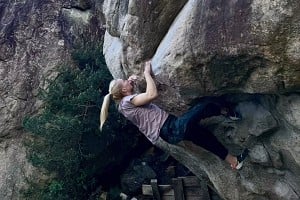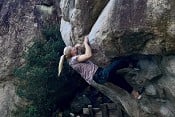
Not so explains an article in todays New York Times entitled 'How To Grow A Super Athlete' by Daniel Coyle (in Play, a New York Times Sports Magazine).
It's all to do with practice, practice, practice and discipline, and more to the point myelin a material that wraps around nerve fibers and becomes more efficient the more we 'practice' movements, excercises and complex skills, from trying a tricky boulder problem to playing the violin. Much of the current research into myelin has actually been carried out by a climber, Douglas Fields (website), the director of the Laboratory of Developmental Neurobiology at the National Institutes of Health in Bethesda, Md in the USA.
If you are quick, and register as a user at nytimes.com - click here, you can read the full article (much more detailed than this news report can describe) and if you scroll down the homepage to Video and click on the left hand thumbnail of a climber and 'The Brains Behind The Talent' you can hear a synopsis of the article and see Douglas Fields and his daughters climbing.
This article and research goes far beyond climbing of course. If you are a parent or a student, read it, it may reinforce views you already have or might be a complete revelation.
In the same Play magazine, is an article entitled, Climb Like A Girl, a photo-essay by Arno Rafael Minkkinen with commentary by Elizabeth Hightower that explains how the hormonal balance is shifting in climbing. You may remember UKClimbing.com ran a series of four articles with the same title in April 2005 (read UKClimbing.com's Climb Like A Girl articles here) that have been viewed 106,415 times since then. You can also catch a slide show at nytimes.com - click here about the Hightower article.





Comments